Europe has played a crucial role in shaping global history through its cultural, political, and economic developments. From the transformative Renaissance to the revolutionary changes of the French Revolution, Europe has witnessed significant events that influenced modern thought and governance. The continent experienced the turmoil of World War I and the ideological battles of the Cold War, leading to the establishment of the European Union. Understanding these dynamics is essential for grasping Europe’s impact on contemporary global affairs.
Learning Objectives
When studying “Europe” for AP World History: Modern , focus on analyzing the Renaissance’s impact on art, culture, and philosophy, as well as examining the causes and effects of the French Revolution and its role in fostering nationalism. Investigate World War I’s causes and consequences, considering alliances and militarism, and understand the dynamics of the Cold War, particularly Europe’s division and its resolution. Assess the European Union’s formation and its role in economic cooperation, while analyzing major social movements like nationalism and feminism. Additionally, explore the economic transformations from the Industrial Revolution and recognize key historical figures such as Napoleon Bonaparte and Winston Churchill in shaping European and global history.
1. Key Themes in European History
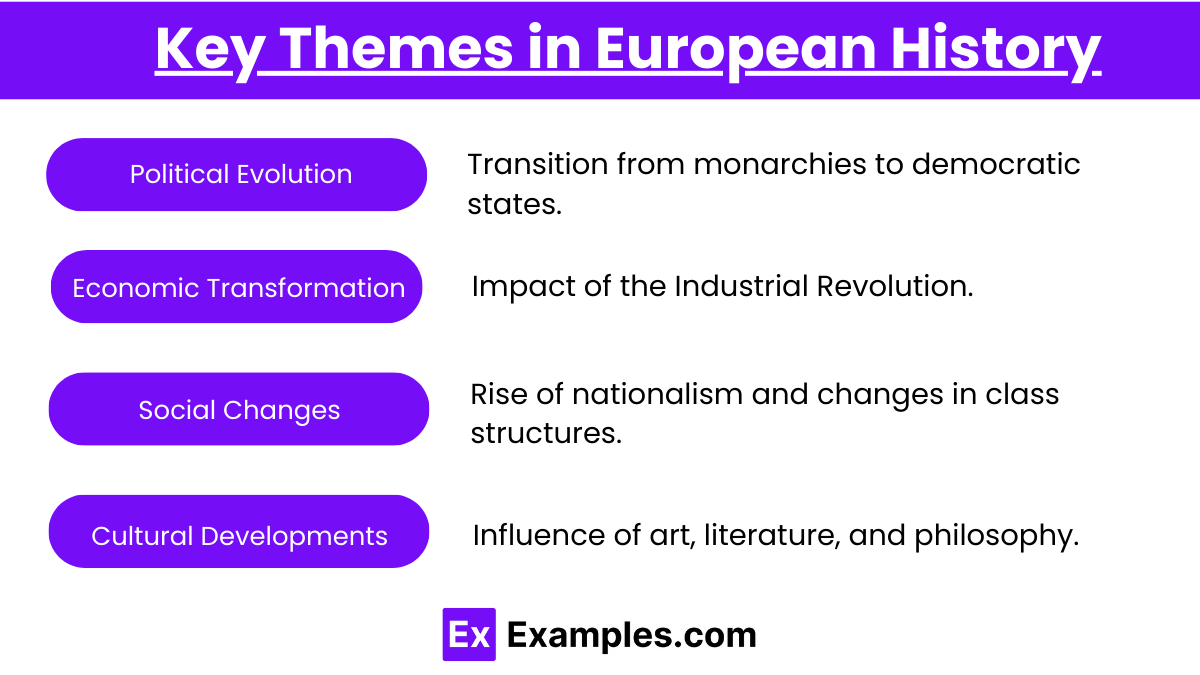
- Political Evolution: Transition from monarchies to democratic states.
- Economic Transformation: Impact of the Industrial Revolution.
- Social Changes: Rise of nationalism and changes in class structures.
- Cultural Developments: Influence of art, literature, and philosophy.
2. Political Developments
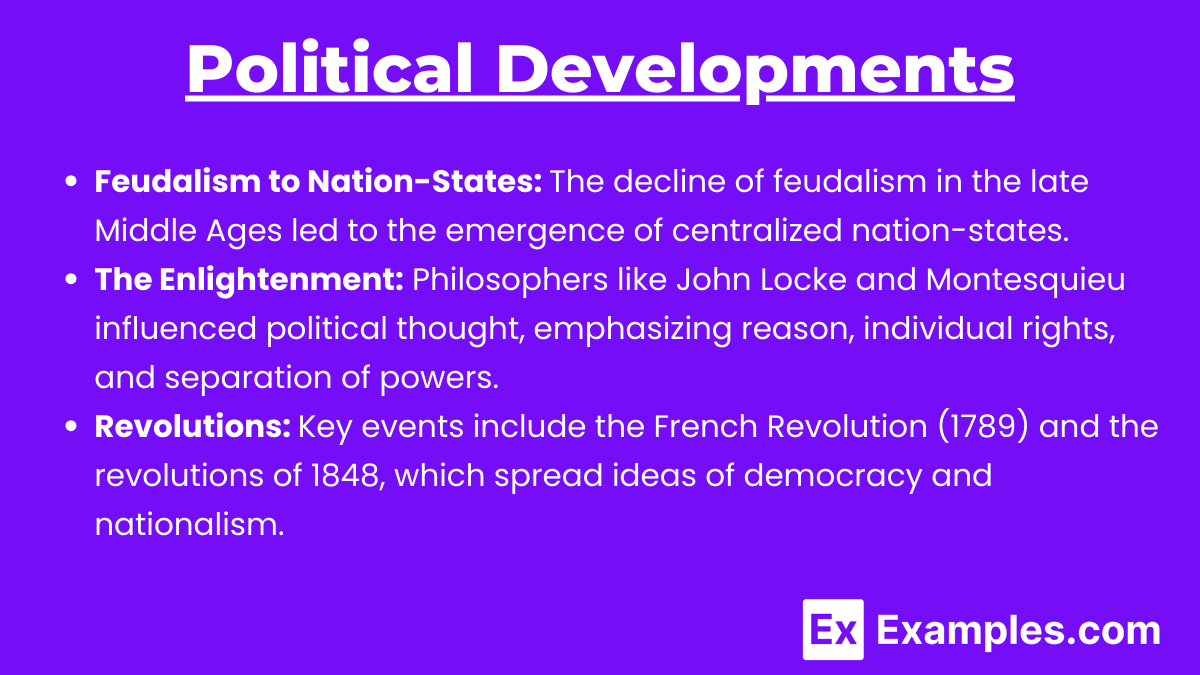
- Feudalism to Nation-States: The decline of feudalism in the late Middle Ages led to the emergence of centralized nation-states.
- The Enlightenment: Philosophers like John Locke and Montesquieu influenced political thought, emphasizing reason, individual rights, and separation of powers.
- Revolutions: Key events include the French Revolution (1789) and the revolutions of 1848, which spread ideas of democracy and nationalism.
3. Economic Changes
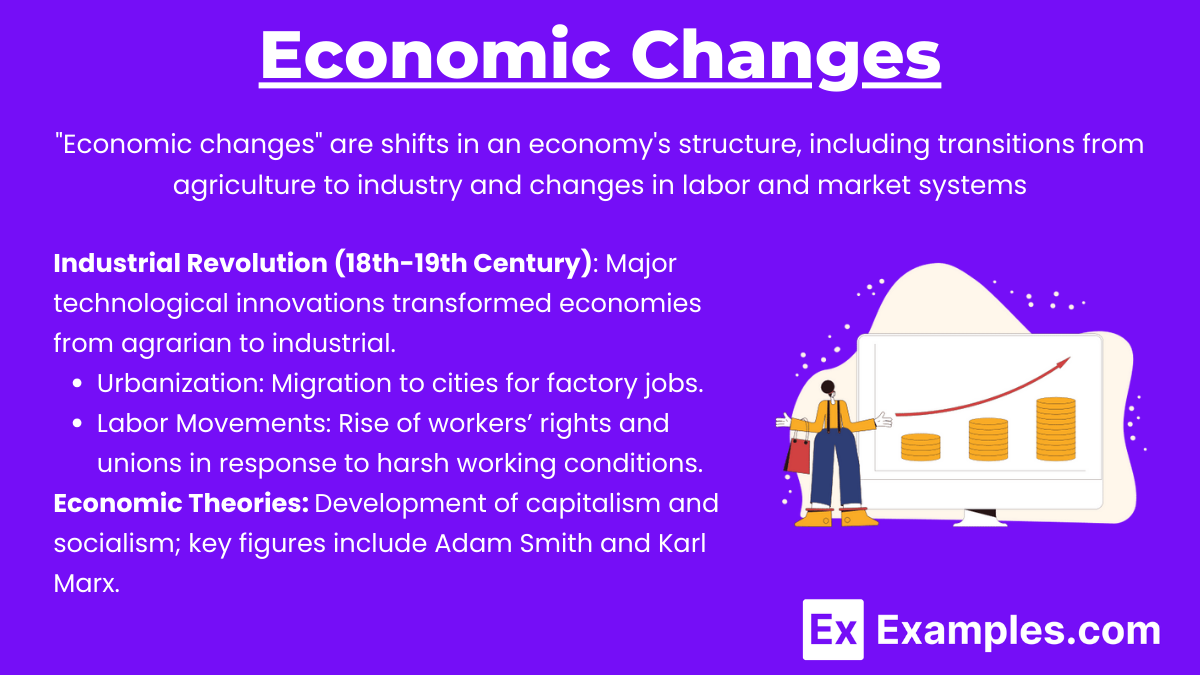
“Economic changes” refer to shifts in an economy’s structure and functioning, including transitions from agriculture to industry, changes in labor dynamics, the emergence of new market systems like capitalism, and the impact on trade and society. These changes reflect how economies adapt to technological advancements and evolving social needs.
- Industrial Revolution (18th-19th Century): Major technological innovations transformed economies from agrarian to industrial.
- Urbanization: Migration to cities for factory jobs.
- Labor Movements: Rise of workers’ rights and unions in response to harsh working conditions.
- Economic Theories: Development of capitalism and socialism; key figures include Adam Smith and Karl Marx.
4. Social Developments
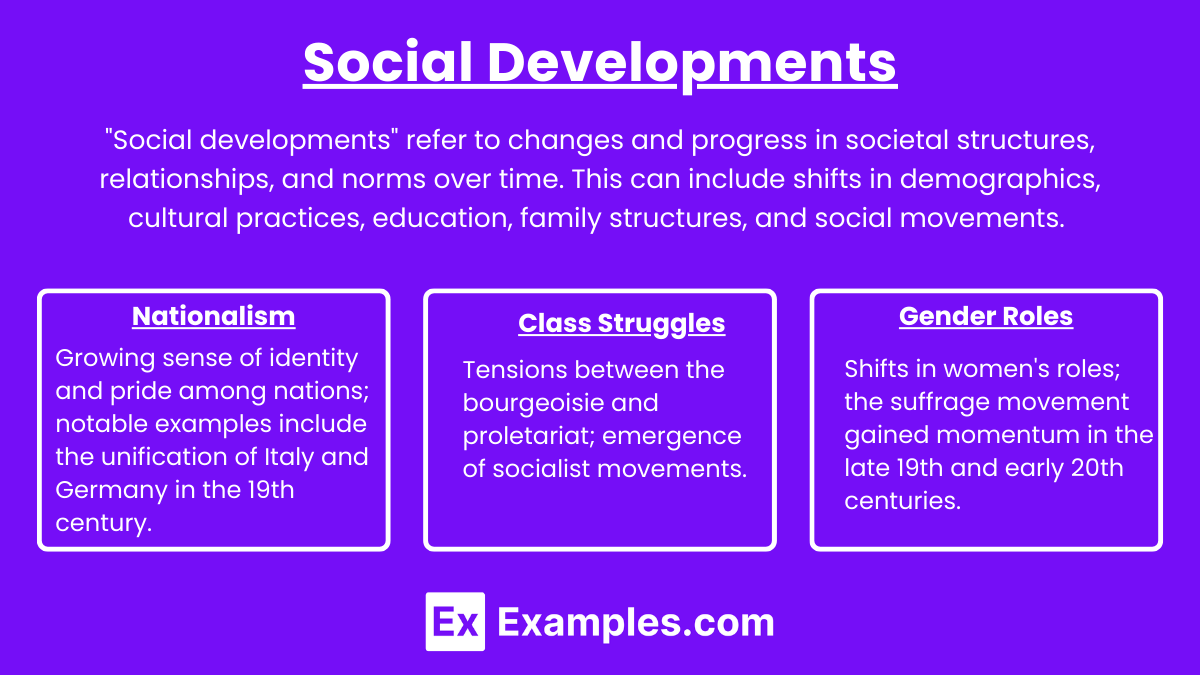
“Social developments” refer to changes and progress in societal structures, relationships, and norms over time. This can include shifts in demographics, cultural practices, education, family structures, and social movements. These developments impact how individuals and groups interact, influence societal values, and shape the overall quality of life within communities.
- Nationalism: Growing sense of identity and pride among nations; notable examples include the unification of Italy and Germany in the 19th century.
- Class Struggles: Tensions between the bourgeoisie and proletariat; emergence of socialist movements.
- Gender Roles: Shifts in women’s roles; the suffrage movement gained momentum in the late 19th and early 20th centuries.
5. Cultural Influences
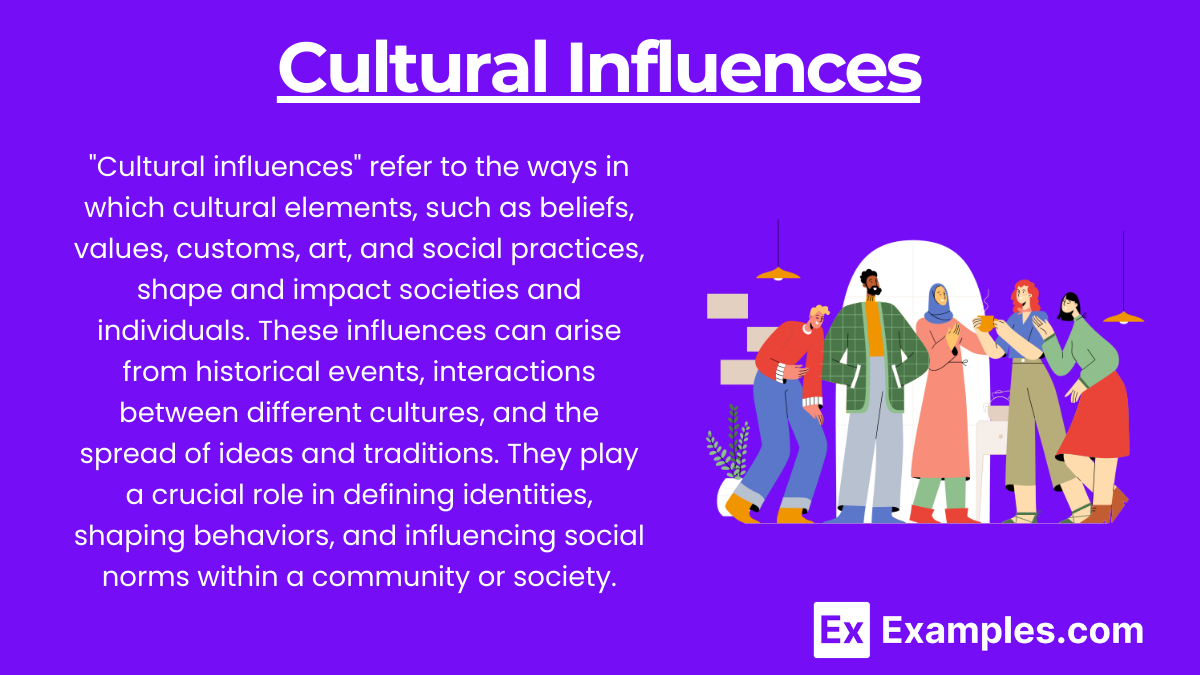
“Cultural influences” refer to the ways in which cultural elements, such as beliefs, values, customs, art, and social practices, shape and impact societies and individuals. These influences can arise from historical events, interactions between different cultures, and the spread of ideas and traditions. They play a crucial role in defining identities, shaping behaviors, and influencing social norms within a community or society.
- Art and Literature: Movements like Romanticism and Realism reflected societal changes and individualism.
- Philosophical Movements: Existentialism and other philosophical trends questioned traditional values and morality.
- Scientific Advances: Contributions from figures like Darwin and Freud influenced both science and culture.
Examples
Example 1 : The Renaissance (14th-17th Century)
The Renaissance marked a profound cultural revival in Europe, beginning in Italy and spreading across the continent. This period saw a resurgence of interest in classical art, literature, and philosophy. Artists like Leonardo da Vinci and Michelangelo redefined artistic standards, producing iconic works that emphasized human emotion and realism. Thinkers such as Erasmus and Machiavelli influenced political thought, promoting ideas about governance and ethics. The Renaissance laid the groundwork for modern science, exploration, and the eventual rise of the Enlightenment, fundamentally changing the intellectual landscape of Europe.
Example 2 : The French Revolution (1789-1799)
The French Revolution was a pivotal event in European history that dismantled the feudal system and established the principles of liberty, equality, and fraternity. Sparked by social inequality, economic hardship, and Enlightenment ideas, the revolution began with the storming of the Bastille and led to the rise of radical factions, including the Jacobins. Key figures like Maximilien Robespierre emerged, advocating for radical change. The revolution culminated in the rise of Napoleon Bonaparte, who spread revolutionary ideals across Europe through his conquests. The event inspired subsequent revolutionary movements and significantly altered the political landscape, contributing to the rise of nationalism.
Example 3 : World War I (1914-1918)
World War I, also known as the Great War, involved many European powers and marked a significant turning point in global history. Triggered by a complex web of alliances, militarism, and nationalism, the war resulted in unprecedented destruction and loss of life. Major battles, such as the Battle of the Somme and the Battle of Verdun, exemplified the brutal trench warfare that characterized the conflict. The war ended with the Treaty of Versailles, which imposed harsh reparations on Germany and redrew the map of Europe, leading to significant political and social upheaval. This set the stage for future conflicts, including World War II, as unresolved tensions simmered beneath the surface.
Example 4 : The Cold War (1947-1991)
The Cold War was a period of geopolitical tension between the Soviet Union and Western powers, particularly the United States. Europe became a battleground for ideological conflict, with the Iron Curtain dividing Eastern communist nations from Western democracies. Key events, such as the Berlin Blockade and the establishment of NATO and the Warsaw Pact, highlighted the struggle for influence. The Cold War also saw proxy wars in various regions, as both superpowers sought to expand their ideologies. The eventual fall of the Berlin Wall in 1989 symbolized the end of the Cold War and led to the reunification of Germany, reshaping the political landscape of Europe.
Example 5 : European Union Formation (1993-Present)
The establishment of the European Union (EU) marked a significant step towards political and economic integration among European nations. Originating from earlier agreements like the European Economic Community, the EU aims to foster cooperation and prevent conflict through a shared governance framework. With a common market and policies on trade, environment, and security, the EU has become a major political entity in global affairs. However, challenges such as the Eurozone crisis, migration issues, and Brexit have tested the union’s cohesion and raised questions about its future direction. The EU continues to play a crucial role in promoting stability and prosperity in Europe.
Multiple Choice Questions
Question 1
What was a primary cause of the French Revolution in 1789?
A) The spread of communism
B) The influence of Enlightenment ideas
C) The establishment of the European Union
D) The Industrial Revolution
Correct Answer: B) The influence of Enlightenment ideas
Explanation: The French Revolution was largely inspired by Enlightenment thinkers who emphasized reason, individual rights, and equality. Philosophers like John Locke and Rousseau advocated for the idea that governments should be based on the consent of the governed. This intellectual backdrop contributed to widespread dissatisfaction with the absolute monarchy and social inequality, leading to the revolutionary movement.
Question 2
Which event marked the beginning of World War I?
A) The signing of the Treaty of Versailles
B) The assassination of Archduke Franz Ferdinand
C) The bombing of Pearl Harbor
D) The fall of the Berlin Wall
Correct Answer: B) The assassination of Archduke Franz Ferdinand
Explanation: The assassination of Archduke Franz Ferdinand of Austria-Hungary in June 1914 was the immediate trigger for World War I. This event set off a chain reaction of alliances and mobilizations among the major powers of Europe, ultimately leading to the outbreak of war in August 1914. The complex web of alliances, nationalism, and militarism contributed to the escalation of the conflict.
Question 3
What significant change did the fall of the Berlin Wall in 1989 represent?
A) The end of World War II
B) The beginning of the Cold War
C) The collapse of communist regimes in Eastern Europe
D) The establishment of the European Union
Correct Answer: C) The collapse of communist regimes in Eastern Europe
Explanation: The fall of the Berlin Wall symbolized the decline of communist control in Eastern Europe and the end of the Cold War. It marked a pivotal moment in history, leading to the reunification of Germany and the subsequent dismantling of communist governments across the region. This event was a key indicator of the shift towards democracy and market economies in formerly communist states, ultimately contributing to the expansion of the European Union.


